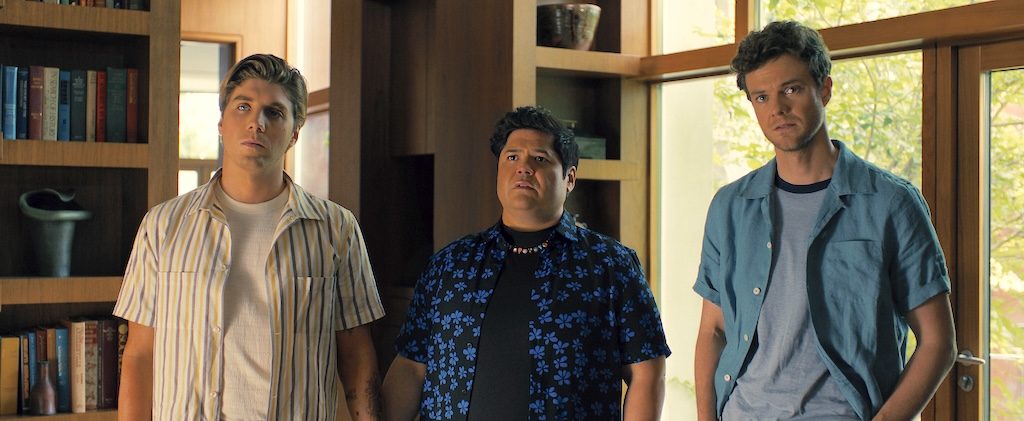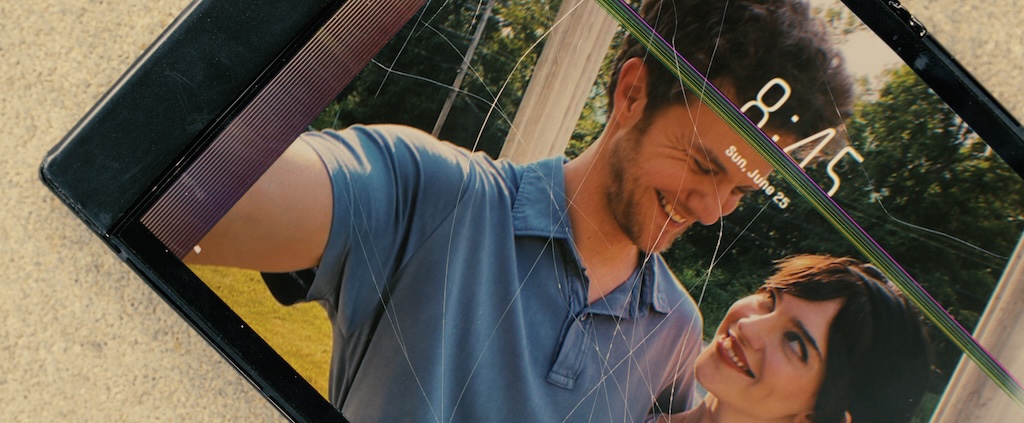Screenwriter Drew Hancock, best known for his work My Dead Ex and Suburgatory, wanted to reignite his passion for directing with the wildly, and often gruesome, Companion – a original spec script about love and robots.
Momentum for Companion began when writer/ director Zach Cregger responded to Hancock’s script before Barbarian was released. Cregger initially considered directing Companion as his followup to Barbarian, but instead, decided that Drew was the better choice since he originated the project. Zach remained as a producer. Companion stars Sophie Thatcher, Jack Quaid and Lukas Cage. Drew Hancock shares his thoughts on the film with Creative Screenwriting Magazine.
“We spent about five or six weeks in that time leading up to Barbarian polishing, refining, and focusing the script,” recalls Hancock. Drew adds that both he and Zach have similar cinematic tastes, so certain aspects of Barbarian were naturally infused into Companion.
Drew forged his career writing comedies, but he wanted to lean into his preferred brand with Companion.
“It took me a long time to come to this cathartic moment,” he mentions. “If you want to write genre scripts, you love horror, you love sci-fi and thriller, you’re not getting those jobs if you don’t have a writing sample that reflects the kinds of movies that you like. Companion was born out of that necessity to have something that represents my voice.”
“And just from a screenwriting perspective, you sometimes forget the best audience at the beginning is you. If it excites you, it’ll probably excite other people.”
Breakups Are Hard
Companion charts the rocky path of love in search of a perfect mate and what happens when things go awry. It’s exacerbated by AI, programming, and robots. Does the perfect parter even exist? Hancock prefers not to prescribe any answers, but prefers “to raise more questions. I love hearing people talk about the movie after they leave.”

Drew Hancock. Photo by Sela Shiloni
Drew Hancock skilfully avoids the Stepford Wives, Ex-Machina, and Her AI partner tropes. Companion isn’t really about finding a robot lover after all available human possibilities have been exhausted.
He made his film Iris’ (Thatcher) story. “She’s a robot, but she’s also the most human character in the story. Let’s not think about her as a robot. Let’s not filter this through like a sci-fi lens.”
At its thematic core, Companion is a relationship drama. “It’s a story of a woman breaking up with a toxic man, Josh (Quaid). This is a breakup movie, so let’s filter everything through that idea,” he declares.
I didn’t want to emulate Minority Report. This is more Marriage Story
In folding in the sci-fi elements into the plot, Hancock thinks about his world as being in the “not too distance future. There will be a time when robots and humans are indistinguishable.”
Rather than taking Companion into the laboratory where engineers discuss the possibility and morality of building humanoid robots capable of forming human relationships, Drew examines a world where this already exists and how these relationships are affected. Iris wants to please Josh, but he ironically dehumanizes and objectifies her.
“It’s a Frankenstein of many genres, kind of mashed together. Editing and making it feel seamless was one of the most difficult things about the movie. You don’t want it to feel like you want to have your audience feel tonal whiplash when you’re going from genre to genre to genre.”
Drew Hancock reveals that the first draft of Companion didn’t have any humor to it. “It felt like an episode of Black Mirror and it didn’t reflect my voice. It wasn’t until the third or fourth or fifth draft when I started to infuse my own sense of humor into it. That comes from a place of not writing ‘joke jokes.’ All of the humor comes out of circumstance and people relating to the moment in very real situations.”
Drew dialled the comedy up and down accordingly during post.
“I never want the characters to be aware of what movie they’re in. You don’t want to play the comedy as ‘comedy,’ you want to just make everything as grounded as possible.”
No Judgement
There are two concurrent relationships in Companion – Iris and Josh and Patrick (Lukas Gage) and Eli (Harvey Guillén). Drew never wanted to set up a common paradigm of a couple where one partner is gorgeous and perfect and the other one isn’t. It’s easy to question and mock such couples, but that wasn’t Hancock’s intention in both cases.
“From research, there are people that have found ways to cope with PTSD and other mental disorders through a robot companion. It was important for me to show the other side of that too because people that can use this technology for good, become better people, and grow.”

Patrick (Lukas Gage), Eli (Harvey Guillén) & Josh Josh (Jack Quaid) Photo courtesy of Warner Bros. Pictures
“I didn’t want to just tell Josh’s story about someone who’s abusing his robot girlfriend and just using her for sex so he could feel better about himself.”
“My first instinct for Companion is to describe it as three couples go to a cabin in the middle of nowhere and one of them discovers there’s a robot who’s going to get shut down and things go south. I knew it was going to have a horror structure where someone gets picked off every ten pages.”
Drew didn’t decide to reframe Companion through Iris’ eyes until later versions of the script. Josh was originally going to be the good guy and it was a ‘robot gone rogue’ story. A slew of movies like Megan that were subsequently released filled that void.
Writing Companion On Spec
Drew Hancock wrote Companion on spec, not as a writer for hire. This affected the screenplay. “Let’s not think about it as a movie that got made. Let’s think about it as a spec you’re sending to taste makers and gatekeepers who have every reason to throw your script in the trash.”
“The first couple pages need to hook the audience and the reader in. The point of the first act is to lure the audience into a familiar territory where they’re second guessing where it’s going to go. And then when the big reveal happens, all bets are off.”
Hancock refers to Iris’ dialogue in the opening scene, “There were two times I felt truly happy. First, the day I met Josh; second, the day I killed him. Companion is purposely obtuse,”
“There’s a purposeful banality to it to make it just seem like this is a thing we’ve seen a billion times before.”
The filmmaker sets up an intriguing premise and the tone. Drew quotes James Cameron’s approach to Aliens to illustrate his point, “You want to set up a promise of a nightmare.”
“It felt low budget and it’s probably the most likely to get made because it has limited cast and locations. It’s a sci-fi movie with not a lot of practical effects.”
